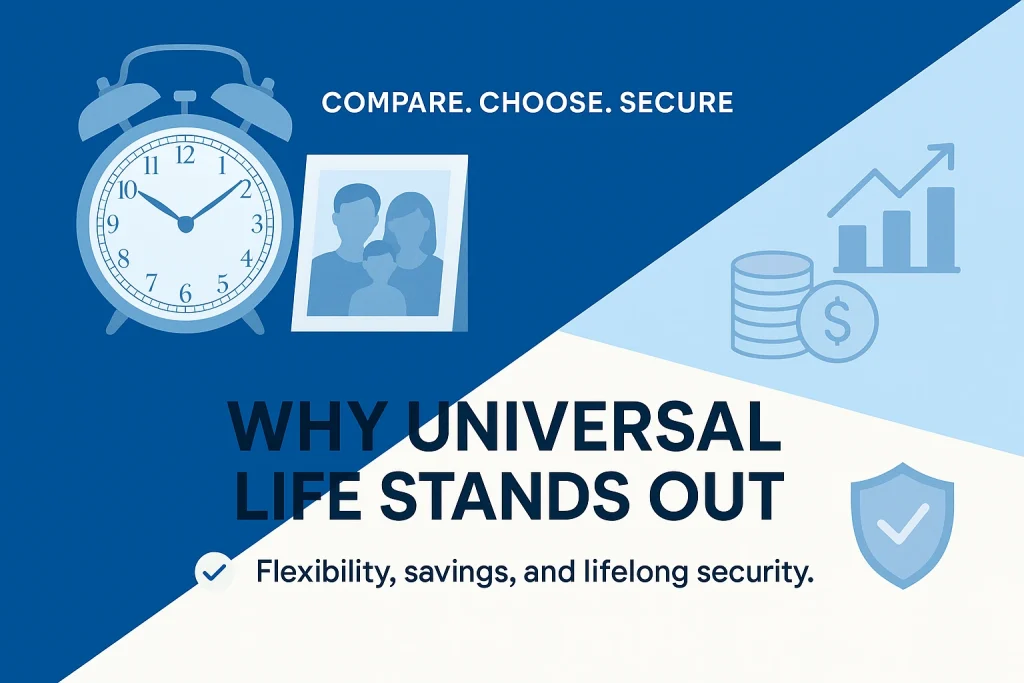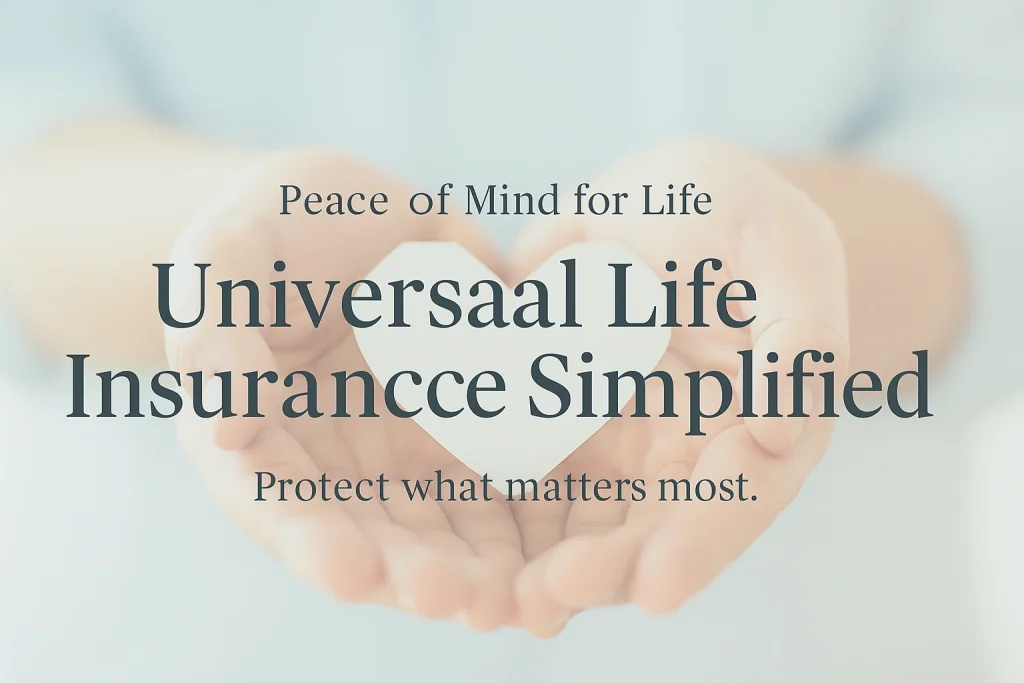Universal life insurance offers flexible lifetime protection, with adjustable premiums and a growing cash value.It allows you to adjust payments and death benefits as your needs change. This guide explains what universal life insurance is, how it works, the different types such as indexed and variable universal life, the pros and cons, cost examples, and how to choose the best provider. It’s written in simple language to help you understand how this policy can protect your family and support long-term financial goals.

What Is Universal Life Insurance?
Universal life insurance is a permanent life insurance policy that provides lifelong protection while building a cash value you can access during your lifetime. It is designed for people who want financial security, flexibility, and an opportunity to grow their money over time.
When you pay your premium, one portion covers your life insurance cost, and the other goes into a cash value account that earns interest or market-based returns. You can borrow from or withdraw that money when needed, which makes this policy flexible compared to traditional options.
Universal life insurance stays active for your entire life as long as there is enough cash value or premiums are paid.
How Universal Life Insurance Works
Each premium you pay goes into two parts:
- The cost of insurance – covers the protection or death benefit.
- The cash value account – grows tax-deferred and earns interest.
Your insurer deducts policy fees and costs, while the rest remains in your account to accumulate value.
If the cash value grows enough, it can pay your future premiums automatically. But if it falls too low and you stop paying, your coverage may lapse. That’s why reviewing your policy every year is important.
Example
Imagine paying $400 each month. About $150 covers the cost of insurance, and $250 grows in your cash value account. Over time, this balance can be used for college costs, emergencies, or retirement income.

Main Features of Universal Life Insurance
- Flexible Premiums – You can increase or lower payments based on your financial situation.
- Adjustable Death Benefit – You can raise or reduce your coverage when your needs change.
- Cash Value Growth – The savings portion grows at a fixed rate or follows a market index.
- Tax Advantages – Your cash value grows tax-deferred, and the death benefit is usually tax-free.
- Lifetime Protection – As long as the policy is funded, your coverage never expires.
These features make universal life insurance a good choice for people who want control over their coverage and financial growth.
Types of Universal Life Insurance
Standard Universal Life Insurance
This basic type earns a fixed interest rate. It provides predictable growth and long-term protection without market risk.
Indexed Universal Life Insurance (IUL)
Index universal life insurance ties your cash value to a market index like the S&P 500. Your returns depend on how the index performs but your funds are not directly invested in the market. These policies often have a minimum and maximum growth rate to limit risk.
Variable Universal Life Insurance (VUL)
Variable universal life insurance allows you to invest in subaccounts that work like mutual funds. It offers higher potential returns but also more risk since your cash value can decrease if the market drops.
Guaranteed Universal Life Insurance (GUL)
This type focuses on a guaranteed death benefit rather than high cash value growth. It is best for people who want stable, permanent coverage at a predictable cost.

What Are Advantages of Universal Life Insurance?
Flexibility: You can adjust your payments and death benefit anytime.
Cash Value Growth: The cash value account grows with interest or market performance and can become a financial resource in the future.
Tax Benefits: You do not pay taxes on cash value growth until you withdraw the money.
Lifetime Coverage: The policy lasts as long as it remains funded.
Investment Options: Indexed and variable universal life insurance give you choices for potential higher returns.
Universal life insurance can serve as both protection and a financial planning tool that builds savings over time.
What Are The Disadvantages Of Universal Life Insurance?
Complexity: These policies are more complicated than term or whole life insurance.
Possible Lapse: If you pay less than needed or interest rates drop, your policy could lose value and end.
Market Risk: Indexed and variable universal life depend on market performance, which can be unpredictable.
Active Management: You need to review your policy regularly to keep it performing well.
Being aware of these drawbacks helps you make smarter financial decisions.
Comparing Universal Life Insurance with Other Policies
| Feature | Term Life | Whole Life | Universal Life |
|---|---|---|---|
| Coverage Period | 10–30 years | Lifetime | Lifetime |
| Premiums | Fixed | Fixed | Flexible |
| Cash Value | None | Guaranteed | Flexible |
| Investment Control | None | None | Optional |
| Typical Cost | Low | High | Moderate |
Universal life insurance vs term life:
Term life is affordable and simple but ends after a set period. Universal life offers lifetime coverage and cash value that can grow over time.
Universal life insurance vs whole life:
Whole life has guaranteed cash value and stable premiums. Universal life provides more flexibility and potential for higher returns.

How Much Does Universal Life Insurance Cost
Costs vary depending on your age, health, coverage amount, and the type of universal life insurance you choose. Younger and healthier people pay less.
A healthy 40-year-old might pay around three hundred dollars per month for a policy with a five-hundred-thousand-dollar death benefit. The premium could increase if you add riders or choose an indexed or variable policy.
You can estimate your rate or use an online universal life insurance calculator from Nationwide to understand your potential costs.
Is Universal Life Policy Right for You
Universal life insurance is designed for people who want coverage that lasts their entire life and the flexibility to manage how they pay for it.
It may be a good fit if you:
- Want permanent protection and long-term savings growth.
- Have variable income and prefer premium flexibility.
- Want to access cash value for future needs.
- Plan to manage your policy actively.
It may not be ideal if you only need short-term coverage or prefer a policy that requires no ongoing management.
How to Choose the Best Universal Life Insurance Policy
Check the Company’s Financial Strength
Pick an insurer with strong financial ratings to ensure your policy remains secure.
Compare Policy Types
Choose between fixed, indexed, or variable universal life insurance depending on your goals and risk tolerance.
Review Policy Illustrations
Ask for projected scenarios to understand how your premiums, cash value, and death benefit might change.
Consider Optional Riders
Look for useful add-ons like a no-lapse guarantee, waiver of premium, or living benefit for chronic illness.
Explore Reputable Providers
- Nationwide offers flexible plans with strong digital tools.
- MassMutual provides competitive indexed universal life options.
- Pacific Life specializes in variable and best indexed universal life insurance.
You can also explore our detailed guide on Final Expense Policy to see how smaller policies can complement your main plan.
Faq’s
What is a universal life insurance policy?
It is a permanent life insurance policy that offers lifetime protection and builds cash value you can access while alive.
How does universal life insurance work?
Part of your premium pays for insurance, and the rest grows in a cash value account that earns interest or market-based returns.
Does universal life insurance expire?
No, it stays active for life as long as you maintain enough cash value or continue paying premiums.
How much does universal life insurance cost?
Costs depend on age, health, and coverage amount. Universal life insurance is typically more expensive than term life but more flexible than whole life.
What are the benefits of universal life insurance?
It offers flexibility, lifetime protection, cash value growth, and tax-deferred savings.
How can I tailor universal life insurance to my needs?
You can adjust your premiums, death benefit, and add riders to personalize your coverage as your life changes.
Final Thought
Universal life insurance combines protection and flexibility into one lifelong plan. It allows you to build value, adapt your coverage, and create lasting financial stability for your loved ones.
If you are considering a policy, compare options, study illustrations carefully, and select a trusted insurer that aligns with your goals. With the right universal life insurance policy, you gain both peace of mind and a foundation for financial growth.







